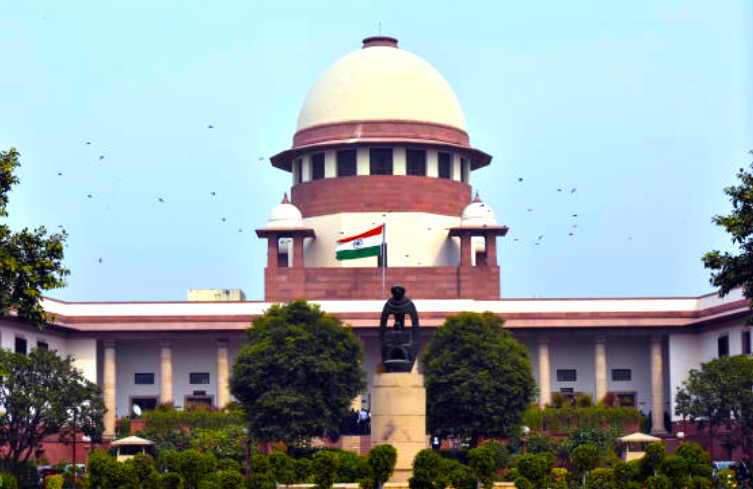Lawmakers’ immunity issue: After 21 years, Supreme Court to revisit JMM bribery case
 The Supreme Court of India.
The Supreme Court of India.
New Delhi: The Supreme Court will soon seek to answer again the decades-long question whether a member of Parliament or a member of a state legislative assembly can claim immunity from criminal prosecution for taking bribe to give a speech or vote in a particular way in Parliament or an assembly when it will revisit its 21-year-old verdict in the sensational Jharkhand Mukti Morch bribery case. Earlier, the Supreme Court had ruled that lawmakers are immune to criminal prosecution for their actions inside Parliament or a state assembly. But that may change soon, now.
Chief Justice Ranjan Gogoi referred to a higher bench the appeal of Sita Soren, incidentally also a Jharkhand Mukti Morcha MLA, against the high court order for quashing the criminal case lodged against her for allegedly taking bribe to vote for a particular candidate in Rajya Sabha election held in 2012. Sita Soran is also the daughter-in-law of former Union minister Shibu Soren, who was involved in the JMM bribery case.
The top court, on Thursday, considered its 1998 five-judge Constitution bench verdict given in the PV Narasimha Rao versus CBI case. The verdict then held that parliamentarians had immunity under the Constitution against criminal prosecution for their speech or vote given in the house.
The outcome of this case will have wide ramifications on the conduct of the lawmakers in the country, who enjoy blanket immunity from prosecution or libel for their seemingly law-breaking actions inside Parliament or a state assembly.
What is the JMM bribery case?
In 1991 Lok Sabha election, the Congress got 258 seats, 14 short of majority mark of 272 in the Lower House of Parliament. However, it went to form the government with PV Narasimha Rao as the prime minister. In July 1993, the government faced a no-confidence motion, which threatened the fall of the government. However, the government somehow managed to defeat the motion with the support of 265 MPs against the 251 who voted in favour of the motion.
Later, one Ravinder Kumar of the Rashtriya Mukti Morcha filed an FIR with the Central Bureau of investigation alleging that the Rao government hatched a criminal conspiracy with some JMM and Janata Dal (Ajit) MPs, who received bribes from Rao and others to vote in favour of the government. Kumar alleged that four JMM MPs – Shibu Soren, Suraj Mandal, Simon Marandi, and Shailendra Mahto – along with some MPs the Janata Dal (Ajit) were paid at least ₹8.7 crores to ensure the survival of the Rao government.
A criminal prosecution was subsequently launched against those who gave and received bribes under the Prevention of Corruption Act, 1988 and under Section 120B of the Indian Penal Code. The special judge took cognizance of the offences of bribery and criminal conspiracy. Narasimha Rao and another senior Congress leader, Buta Singh, was also named in the case.
The accused named in the FIR filed petitions at the Delhi high court for quashing the criminal proceedings, but the court dismissed the petitions.
The accused then moved the Supreme Court, which formed a Constitution bench to decide upon two key questions:
1. Does Article 105 of the Constitution confer any immunity on an MP from being prosecuted in a criminal court for an offence involving offer or acceptance of a bribe?
2. Is an MP excluded from the ambit of the Prevention of Corruption Act, 1988 [pdf] for the reason that:
a) he is not a person who can be regarded as “public servant” as defined under Section 2(c) of the PCA,
and
b) he is not a person comprehended in clauses (a), (b) and (c) of sub-section (1) of Section 19 and there is no authority to grant sanction for his prosecution under the PCA?
In 1998, the Supreme Court, in a 3:2 majority verdict ruled that the accused MPs who cast their votes according to the charges against them committed no crime that the legal system can act on.
The key issue Rao’s defence lawyers raised in the Supreme Court was the meaning of Article 105 (2) of the Constitution. It states: “No member of Parliament shall be liable to any proceedings in any court in respect of anything said or any vote given by him in Parliament or any committee thereof, and no person shall be so liable in respect of the publication by or under the authority of either House of Parliament of any report, paper, votes, or proceedings.”
The purpose of this constitutional protection was to defend the independence and integrity of Parliament. Without this protection, MPs who voted against a government could face harassment, and speeches made in Parliament would always be subject to the laws of defamation and contempt.
Legal precedent
Apart from the Supreme Court ruling in the JMM case, a Supreme Court verdict, in 1965, vested Article 105(2) with a special status in a case involving an MLA named Keshav Singh and the speaker of the Uttar Pradesh assembly. The bench headed by the-then chief justice of India, Justice Pralhad Balacharya Gajendragadkar, ruled that while the freedom of speech in Parliament guaranteed in Article 105(1) was subject to the discipline of other provisions of the Constitution, the Article 105(2) was absolute in its character, overriding all other imperatives. In this decision, he explained consensual principles of parliamentary democracy.
The principles that Justice Gajendragadkar laid down is still the law.




Leave Your Response